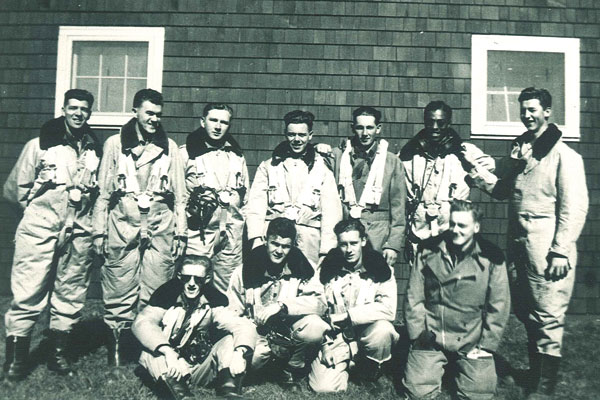Racial barrier-breaking Canadian dies at age 90
By Lookout on Oct 29, 2012 with Comments 0

Lincoln Alexander was one of a handful of black people allowed to enter the military before the Canadian government officially welcomed visible minorities to the forces in 1942.
Photo courtesy, Air Force Association of Canada
“The air force experience taught me the value of self-respect, discipline, and confidence, and those are elements that have served me well throughout my life. They apply to all areas, whether the air force, the law, or politics,” said Lincoln Alexander in his 2006 memoir Go to School, You’re a Little Black Boy.
Lincoln Alexander, Canada’s first black person elected to the House of Commons, first federal cabinet minister and first black person to serve as Lieutenant Governor of Ontario, died Oct. 19, at the age of 90.
He was born in Toronto on Jan. 21, 1922. His father, Lincoln MacCauley Alexander Sr., was from St. Vincent and the Grenadines and his mother, Mae Rose Royale, was from Jamaica. Job options for blacks were limited in those days so his father, who was a carpenter, worked as a railway porter and his mother worked as a maid. Mr. Alexander’s first job was in a laundry in Harlem, New York, where his mother had moved after she left her husband in the 1930s.
In 1942, Mr. Alexander joined the Royal Canadian Air Force. “None of the three services – army, navy and air force – were interested in having blacks,” he said. “I opted for the air force. Besides, I thought I looked best in their uniform.”
In fact, the RCAF did not allow any visible minorities to join up until March 31, 1942. A few recruiters ignored the regulations, enlisting six black Canadians between 1932 and 1942, while at least three black Canadians joined in 1936 and 1939. Major Mathias Joost, of National Defence’s Directorate of History and Heritage, had, as of 2009, been able to identify only 32 black Canadians who served with the RCAF during the Second World War.
Mr. Alexander had poor eyesight and thus was not deployed overseas. He trained as a wireless operator in places such as Guelph, Ont., and Lachine, Que. He then served at Number Seven Air Observer School, in Portage La Prairie, Man., which was a British Commonwealth Air Training Plan (BCATP) establishment. He was discharged at the end of the war, with the rank of corporal.
“I have a special bond with the people who serve in the Canadian Forces and for those I served with during the war,” he said. “It troubles me deeply to hear the debates that arise annually over whether Remembrance Day is still relevant, or to hear people disparage what our soldiers have done for us. It’s incredibly naïve… We live in a country rich in freedom and democracy, and it is important that we pause annually to recognize those people who have sacrificed so that we can enjoy such privileges.”
Mr. Alexander’s connections with the Air Force continued in his later years. He served as honorary colonel of 2 Tactical Aviation Wing (later 2 Air Wing) from November 1985 to December 1996. A Royal Air Cadet Squadron, 876 Lincoln Alexander Squadron, in Scarborough, Ont., is named in his honour and he was an honorary director of the Air Cadet League of Canada.
Mr. Alexander was educated at McMaster University in Hamilton, Ont., and later studied law at Osgoode Hall in Toronto. Elected as a member of parliament for Hamilton West in 1968, he was Canada’s first black person elected to the House of Commons, serving for 12 years.
He made history again in his final year in Parliament when he was appointed minister of labour, and thus Canada’s first black cabinet minister.
During his more than six years as lieutenant governor of Ontario, he focused on youth and education and an awards program for young people who demonstrate leadership in combating discrimination and racism within their school or community was established in his name.
Among his many honours and appointments, Mr. Alexander was appointed a Companion of the Order of Canada in 1992 and was appointed to the Order of Ontario. Four years later he became chair of the Canadian Race Relations Foundation. He also served as Chancellor of the University of Guelph.
“Mr. Alexander will always be remembered for breaking down racial barriers in Canadian politics, and his concern for social justice, his compassion and his humanity were evident and prominent throughout his life,” said the Minister of National Defence, Peter MacKay in a statement. “He left an indelible imprint on Canada and the Canadian political system.
“His enormous heart and compassion, leadership and love of life matched his physical size. He was a role model for all and will be missed by all who knew him.”
A state funeral was held for Lincoln Alexander on Friday, Oct. 26, in his hometown of Hamilton, Ont.
All Mr. Alexander’s quotations are from Go to School, You’re a Little Black Boy: The Honourable Lincoln M. Alexander: A Memoir, published in 2006 by Dundurn Press.
With files from the office of the premier of Ontario’s website.
Joanna Calder, Air Force PAO
Filed Under: Top Stories
About the Author:





